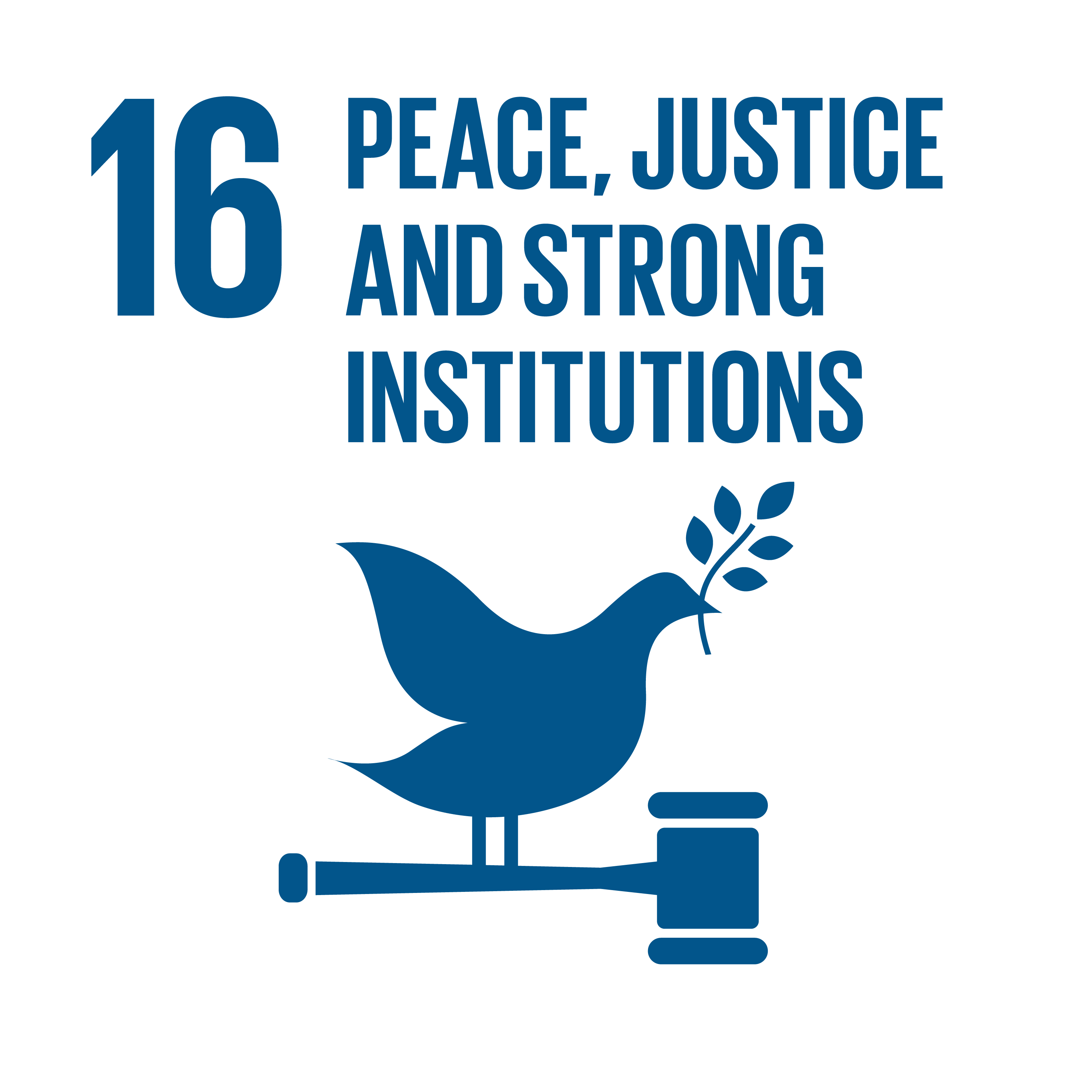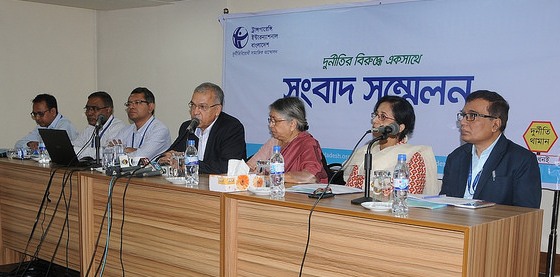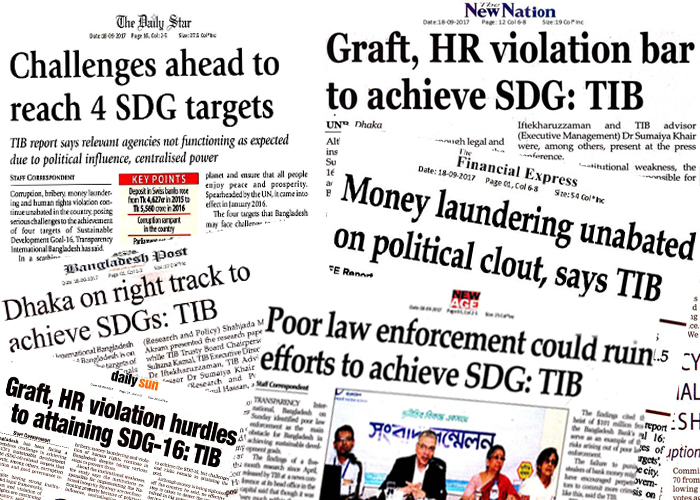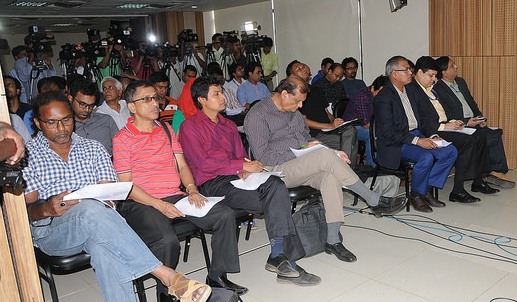Published: 17 September 2017
 The legal, policy and institutional structures for achieving the cherished goal of sustainable development related to curbing corruption and establishing good governance (SDG-16) in Bangladesh is robust however, weaknesses and deficits in laws and their applications, mishandling of law and application of law based on political considerations are creating hindrances to realization of these goals. These observations were made in a TIB research report titled ‘Sustainable Development Goal 16: Preparedness, Realities and Challenges for Bangladesh in Curbing Corruption and Establishing Good Governance’.
The legal, policy and institutional structures for achieving the cherished goal of sustainable development related to curbing corruption and establishing good governance (SDG-16) in Bangladesh is robust however, weaknesses and deficits in laws and their applications, mishandling of law and application of law based on political considerations are creating hindrances to realization of these goals. These observations were made in a TIB research report titled ‘Sustainable Development Goal 16: Preparedness, Realities and Challenges for Bangladesh in Curbing Corruption and Establishing Good Governance’.

Unveiled on 17 September 2017 in a press conference organized by Transparency International Bangladesh (TIB) at its Head office in Dhanmondi Dhaka, TIB Chairperson Advocate Sultana Kamal, TIB Executive Director Dr. Iftekharuzzaman, Adviser for Executive Management Professor Dr. Sumaiya Khair and the Director for research and policy Mohammad Rafiqul Hassan were present during the presentation of the report. TIB’s Senior Program Manager for research and policy Shahzada M. Akram presented the study findings and recommendations. Others present on the occasion included the Senior Program Managers of research and policy department of TIB Md. Waheedul Alam and A S M Juel Mia.
Conducted during April-August 2017, the objective of the study was to review the preparedness, realities and challenges for Bangladesh in achieving the four targets of Sustainable Development Goal-16 (SDG-16) related to curbing corruption and establishing good governance. The indicators are: 16.4 reduce illicit financial and arms flows, strengthen the recovery and return of stolen assets and combat all forms of organized crime, 16.5 substantially reduce corruption and bribery in all their forms, 16.6 develop effective, accountable and transparent institutions at all levels, and 16.10 ensure public access to information and protect fundamental freedoms.
While the qualitative research utilized relevant laws and policies, research reports, international indicators, country-based institutional reports, national databases and reports published in the mass media as indirect sources of information, experts on the subject, academics, government officials, professionals and journalists were interviewed as key informants.
The report shows that despite various initiatives, corruption and bribery, money laundering, violations of fundamental freedoms and human rights have continued unabated in Bangladesh. In the study, the institutions included under the National Integrity Strategy (NIS) are not found effective at a desired level where influences of party politics, centralized power and dominance of the executive branch as well as administration contribute significantly to the situation. Most of the institutions lack the framework for remaining accountable to the people and the internal accountability mechanisms of these institutions are also very weak. Voluntary disclosure of information by different institutions is also quite inadequate.
Besides, although the government had partial information on some subjects including money laundering and asset recoveries related to curbing corruption and good governance, it had limited information about corruption and bribery, level of people’s satisfaction regarding public services cum public institutions as well as extrajudicial killings. Overall, among the 241 indicators of sustainable development goals (SDGs) applicable for Bangladesh, the government had complete information on only 70 and partial information on 108 indicators. The government had no information about 63 indicators.
A principal target among the four targets directly related to curbing corruption and establishing good governance under Sustainable Development Goal-16 (SDG-16) is to “reduce illicit financial and arms flows, strengthen the recovery and return of stolen assets and combat all forms of organized crime.” According to the study, the amount of illegally laundered money from Bangladesh to other countries and from other countries to Bangladesh is gradually increasing. The obstacles to money laundering identified by the research include a deficit in assessing risks at national and sector levels, for example, there is non-recognition of politicisation of regulatory bodies, politico-administrative entente in corruption, three-pronged involvement with politics of the board members in securities and financial institutions and their family-members; non-identification of political appointments in the executive committees or boards of state-owned commercial banks; various limitations in investigation and resolution of cases related to money-laundering, which included procrastination in politically sensitive cases, failure to effectively verify information about money laundering crimes, deficit in the search for sources of illegal money and its management; dearth of capacity in regulatory and supervisory institutions like the ACC and NBR, and non-existence of their own prosecution units, etc.

Another target of the SDG-16 is: 16.5 `substantially reduce corruption and bribery in all their forms’. It has been seen from the research that corruption is pervasive in Bangladesh despite existence of sufficient legal and institutional frameworks, strategies and commitments for curbing corruption. The service-recipients fall prey to large-scale corruption at the household level while seeking services from the public and private sectors and institutions. Besides, Bangladesh has been identified as a highly corruption-prone country by other research studies conducted by many international organizations. The measures for controlling corruption in Bangladesh have not been at the desired level.
However, this research provided information in support of recent positive initiatives in anti-corruption measures in Bangladesh. Out of 12,568 complaints received by ACC in 2016, a total of 1,543 were accepted for investigation and 543 complaints were sent to different divisions and ministries for taking administrative actions. Earlier, 1,020 complaints were accepted on an average for investigation each year. During 2016, apart from filing 359 cases related to obtaining benefits illegally, 13 persons were arrested for taking bribes and appropriate actions were initiated against them, while 388 persons were detained under different cases related to getting illegal benefits. Besides, a hotline has been launched by ACC recently for submitting complaints about corruption.
According the study, the notable challenges to curbing corruption and bribery included, among others: unequal application of the provision for declaring assets by government officers and employees; keeping the employees of some departments outside the purview of enquiry under existing laws; absence of professional obligation to disclose information related to safeguarding public interest; conflict of interests; lack of transparent, effective and timely methods for settling complaintsetc.
Another target directly related to corruption prevention and good governance under SDG-16 is: 16.6 ‘Develop effective, accountable and transparent institutions at all levels’. The research observed that the government have many challenges in achieving this target despite existence of various legal and institutional structures as well as initiatives, as these institutions have not been made effective, transparent and accountable at a desired level. Consequently, the influences of the executive branch are observed in almost all constitutional and regulatory bodies. The head of the government and the cabinet members do not disclose their asset statement. The effectiveness of the judiciary is not at the desired level due to backlog of cases. The local government institutions are dependent on the decisions at the centre regarding service delivery, resource allocation, procurement and implementation. Besides, the upazila and district councils are not yet effective at the desired level. This dependence on centralised decisions in service delivery, resource allocation and procurement is also observed in the area of public administration.
The study further observes that corruption takes place in the recruitment of government employees at different echelons. The effectiveness of law enforcement agencies has also not been found up to the mark. The rate of incidence of crime in the country has remained almost unchanged during the past ten years. Although there are allegations of extra-judicial killings, detentions without trial and forced abductions against these agencies, no statistics are provided on extrajudicial killings. The research also found that the office of Comptroller and Auditor General cannot complete auditing of all government organizations each year due to lack of capacity. There are also tangles of unresolved complaints lying with the National Human Rights Commission and the Information Commission. The appointment process of commissioners to these institutions is not transparent. Some mass media as well as the civil society and NGO sector in Bangladesh are also influenced in many instances. The research revealed that institutional effectiveness, transparency and accountability were being hampered due to prevailing deficiencies in relevant laws. Besides, many institutions were found to be lacking in accountability at a desired level due to control and influence-peddling by different entities including party politics as well as dependence on the government for budgets and administrative personnel.
One of the principal targets of SDG-16 taken into consideration by this research was 16.10 ‘to ensure public access to information and protect fundamental freedoms, in accordance with national legislation and international agreement’. The research found that there was a tendency to curtail fundamental freedoms in Bangladesh despite existence of appropriate legal framework. For achieving the target, the challenges for the government include a tendency to deny any incident of violation of fundamental freedoms of the people; dearth of goodwill and transparency of the government in investigating these incidents and disclosing the findings; misuse of section 57 of the Information and Communication Technology Act, 2006; and the alarming trend of imposing government controls and enhanced restrictions on freedom of expression through draft laws and policies related to the mass media.
During the press conference, Dr. Iftekharuzzaman said, “Although it appears from the research that satisfactory preparedness and capacity exists in the public and private sectors for meeting the targets of Sustainable Development Goal-16, initiatives should be taken on a priority basis for resolving the worrying issues in implementation infrastructure and application by taking into consideration the prevailing deficits. Notable among these are lack of capacity of regulatory and supervisory institutions in preventing money laundering and recovering stolen assets, dearth of regulatory measures at the desired level for curbing the proliferation of corruption, and absence of desired effectiveness of relevant institutions due to bad influences of party politics. Besides, examples like lack of goodwill and transparency in investigating and disclosing the violations of fundamental freedoms of the people, and failure to bring the culprits of banking sector scandals under trial clash with the progress achieved in realizing overall goals. In this instance, especial emphasis should be placed on the principle of SDG ‘leaving no one behind.’

Putting emphasis on the findings and recommendations of the research, Dr. Zaman said, “Bangladesh is on the right track in terms of satisfactory legal and institutional structures alongside capacity and preparedness, however there is risk of being off-track from the path of realizing goals if effective initiatives are not taken for rectifying the deficits and worries revealed identified in the study.”
Advocate Sultana Kamal said, “Although multi-directional plans and initiatives have been taken for achieving sustainable development goals, different surveys and available information show that the benefits fail to reach out the common people. Initiatives to reach them should be significantly included in all the related plans, activities and programmes.”
TIB put forward a set of recommendations for implementation at the legal, institutional and applied levels. Notable among the law-related recommendations were: clear definition and and implementation of the credentials and procedures of the appointment of Chairs and Members of the constitutional and statutory bodies to ensure fair and transparent appointment; allow the MPs to vote against their own parties / decisions except some specific instances through amendment of Article 70 of the Constitution. It also recommended repealing the sections which allow control of the Ministry of Law and Parliamentary Affairs over lower courts; enactment of a Public Service Act to ensure the transparency, accountability, rights andcapacity of the public servants; amendment of the Police Act 1861 and repeal Section 54 of the Special Powers Act 1974 to make the police force more pro-people.
Besides, a law on the formation of the Election Commission, appointment procedure and activities of the EC must be adopted, and the National Human Rights Commission must be empowered to investigate into violations of human rights committed by disciplined forces including LEAs. The study also recommended that the business, political parties and the media must be covered under the RTI Act 2009, and the Section 57 of the Information and Communication Technology Act 2006 must be repealed; and the repressive part of the Section 57 of the Foreign Donations (Voluntary Activities) Regulation Act, 2016 must be repealed.
The institutional recommendations included, among others, increased institutional capacity where the organograms of the concerned agencies should be reviewed and the staff strength, posting of own staff instead of deputation, and the level of skill and capacity, infrastructural facilities should be increased; increased financial capacity through increasing the budgets for concerned anti-corruption institutions (ACC, OCAG, judiciary, law enforcing agencies) according to need; and increased capacity of preventing money-laundering through ensuring dedicated money laundering investigation and prosecution units for LEAs like ACC, NBR, and DNC ; and empowerment of the customs authority to identify over-invoicing, under-invoicing, over-shipment, under-shipment or phantom shipment to curb illicit flow of fund; and ensure both positive and negative incentives for the transparency and accountability of public institutions. In the category of applied recommendations, conducting a national baseline survey on to determine the baseline on the state of corruption and bribery, people’s satisfaction and trust on NIS institutions was put forward. Besides, adoption of goal-based action-plan by according especial importance to SDG-16, taking steps against corruption, swift resolution of corruption cases, ensuring transparent procurement process and formation of judicial inquiry committee for investigating all extra-judicial killings were also recommended.
Useful links of Sustainable Development Goal 16: Preparedness, Realities and Challenges for Bangladesh - (Click below)
#Executive Summary (English)
#Executive Summary (Bangla)
#Full Report (English)
#Presentation (Bangla)
#FAQ (Bangla)
********************************************







